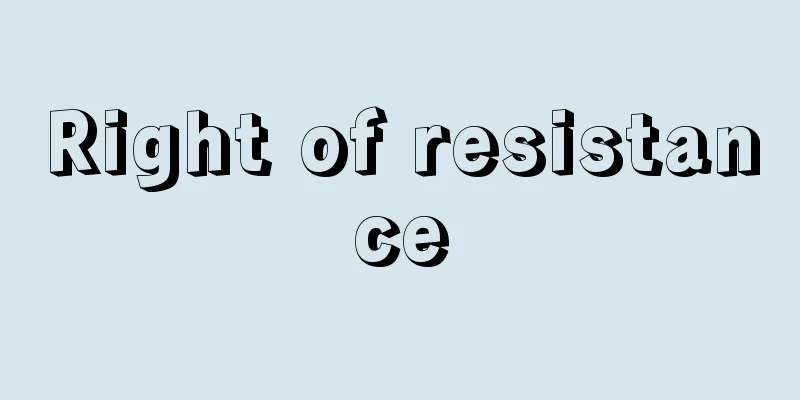Right of resistance

|
The right of an individual or group to resist public authority such as a state or government. It is also called the right of rebellion. Today, the right of resistance is explicitly stipulated in constitutions such as the Bonn Basic Law and the state constitutions of Hesse and Berlin. The significance of the right of resistance lies in its ideological principle of seeking to guarantee human rights, establish freedom, and develop a democratic political system. [Hiroshi Tanaka] The idea of the right to resist before the civil revolutionThe idea of the right of resistance was seen as far back as the Greek and Roman eras, and even in medieval feudal society, but the most famous historical reference is the following passage in Article 61 of Magna Carta: "These twenty-five barons, together with the people of the whole country, shall by all means at their disposal, that is, by the seizure of castles, lands, property, etc., and by any other means at their disposal, inflict upon me and oppress me, until I have reformed as they shall judge proper." This article is considered to have recognized the right of resistance of the nobles against the king. Later, in England, as the parliamentary system was established, the system in which the king, nobles, and commoners peacefully discussed national affairs in parliament was established, and the idea of the right of resistance was hidden for a time until the 17th century, when the conflict between the king and parliament intensified and religious struggles became evident. In contrast, the idea of the right of resistance flourished in the continental countries in the second half of the 16th century after the Protestant Reformation. This was particularly evident in battles between Catholic monarchs and Protestant subjects, and between Protestant monarchs and Catholic subjects, and emerged as the idea of "exterminating tyrants," which allowed the killing of pagan monarchs. The idea of the right of resistance, as seen in Oman's Franco-Gallicia (1573) and the anonymous work The Right of Resistance against Tyrants (1579), which is said to have been co-authored by Lange and Morney, had a huge impact on religious and political struggles in Europe, including the Huguenots in France. [Hiroshi Tanaka] Emergence of the modern idea of the right to resistCalvinism is said to be the holy scripture of the idea of the right of resistance, but Calvin himself did not accept the right of individual citizens to resist, and merely stated that civil servants and estates, who were one level lower than the monarch, could advise the monarch about his bad governance.This way of thinking can be said to belong to the tradition of the medieval idea of the right of resistance, which emphasized the hierarchy. The modern idea of the right of resistance began with Hobbes. He stated that if a sovereign ordered his subjects to die, they were free to escape by any means possible, and he also put forward the idea of the right of individual resistance, that if a sovereign ordered his subjects to go to the battlefield, subjects were free to escape by any means possible, whether for reasons of principle or belief, or out of fear of losing their lives. This way of thinking is noteworthy as a precursor to the idea of conscientious objection, which is the argument of today's "abolition of the death penalty." The idea of the right of resistance here positions respect for human life as the highest value. In feudal society, the maintenance of the class system was given top priority, and as can be seen in the example of Sakura Sogoro, peasants who appealed directly to the central government of the shogunate were punished by death as a disruption of the system, regardless of the reason. In this respect, Hobbes's idea of the right of resistance, which recognizes the right of individual resistance, can be said to have a very modern character. Furthermore, if each and every citizen were to exercise the right to resist, it would lead to revolutionary action, so Hobbes' idea of the right to resist can be said to be the prototype of Locke's idea of the right to revolution. The most famous idea in the history of modern ideas on the right of resistance is Locke's idea of the right of revolution. However, this right of revolution should not be seen as a movement that utilizes the strategy and tactics of a conscious revolution, organized with the aim of changing the system, as Marx and Engels did later, but as an extreme form of the exercise of the right of resistance. Locke advocates that when people are dissatisfied with politics, they should first endure it, and when their dissatisfaction grows, they should gradually apply to higher authorities for relief and correction of their dissatisfaction. He also states that only when all the people realize that their lives are in danger can they act to change the government and the legislative branch, and considers this to be an exercise of the right of revolution. In England at that time, rules for peaceful changes of the executive and legislative branches, such as the later system of dissolution, had not yet been established, so Locke defends and justifies the Glorious Revolution by saying that it was an unavoidable act of "appealing to Heaven." In the 18th century, as the practices of party politics and parliamentary cabinet systems became established, the act of "appealing to heaven" developed into a system of dissolution known as an "appeal to the nation." In any case, in modern society where the democratic ideological principle that the power of the state and government is established by the consent of the people has been established, the right to resist should be considered to be reserved to each and every citizen as the exercise of a natural right, whether or not it is explicitly stated in the Constitution, and it can be said that the extreme circumstances of the right to resist are such that they can lead to the exercise of the right of revolution. [Hiroshi Tanaka] [Reference] |Source: Shogakukan Encyclopedia Nipponica About Encyclopedia Nipponica Information | Legend |
|
国家や政府などの公権力に抵抗する個人や集団の権利。反抗権ともいう。今日、抵抗権を憲法上、明文の規定としているものには、ボン基本法やラント(州)憲法であるヘッセン・ベルリン憲法などがあるが、抵抗権の意義は、人権保障や自由の確立、民主的政治制度の整備を求める思想原理という点にある。 [田中 浩] 市民革命前の抵抗権思想抵抗権思想は古くはギリシア・ローマの時代、中世封建社会においてもみられたが、歴史上もっとも有名なものは、マグナ・カルタ第61条の次の文言である。「この25人のバロン(大貴族)は、全国の人々とともに、あらゆる可能な手段によって、すなわち、城、土地、財産の差押え、……その他可能な手段によって、彼らの(適当と)判断するとおりに改められるまで、朕に苛責(かしゃく)と弾圧とを加うべきものとする」。この条文は、国王に対する貴族の抵抗権を認めたものと考えられる。その後、イギリスでは、議会制度が整備されるなかで、国王・貴族・庶民の諸身分が議会の場で平穏に国政について討議する方式が定着したため、17世紀に入って国王と議会の対立が激化し、宗教闘争が顕在化するまでは抵抗権思想は一時期影を潜めた。これに対し、抵抗権思想は、宗教改革後の16世紀後半の大陸諸国家において華々しく展開された。それは、とくに、カトリック君主対プロテスタント臣民、プロテスタント君主対カトリック臣民との間で展開され、異教徒の君主は殺してもかまわない、といういわゆる「暴君放伐」の思想として登場した。なかでもオマンの『フランコ・ガリア』(1573)やランゲとモルネイの共著といわれる匿名の『暴君に対する反抗の権利』(1579)にみられる抵抗権思想は、フランスのユグノー(新教徒)をはじめ、広くヨーロッパ諸国の宗教闘争や政治闘争に巨大な影響を与えた。 [田中 浩] 近代的抵抗権思想の登場カルビニズムは抵抗権思想の聖典といわれるが、カルバン自身は、市民個人の抵抗権は容認せず、君主の悪政については、君主より一段低い官職者や身分議会が君主に忠告できると述べるにとどまり、この考え方は位階制を重視する中世的抵抗権観念の伝統に属するものといえよう。 近代的抵抗権思想はホッブズに始まる。彼は、もしも主権者が臣下に死を命じた場合には、あらゆる可能な手段によって逃亡してもよい、と述べ、また主権者が戦場に行くことを命じた場合には、主義・主張の理由からであれ、生命を失う恐怖感からであれ、臣下はなんらかの手段を講じて免れることもよしとする個人的抵抗権の思想を提起している。このような考え方は、今日の「死刑廃止論」の主張、「良心的徴兵拒否」の思想の先駆的形態として注目されよう。ここでの抵抗権思想は、人命の尊重を最高の価値を有するものとして位置づけているのである。封建社会においては、身分制秩序の維持が最優先され、佐倉惣五郎(そうごろう)の例にもみられるように、農民が幕府中枢部に直訴することは体制破壊者として、その理由のいかんを問わず死罪に処せられたのである。この点でホッブズの抵抗権観念は個人的抵抗権を認めたきわめて近代的な性格をもつものといえよう。また、もしも全国民がそれぞれ抵抗権を行使したとしたら、それは革命行動につながるから、ホッブズの抵抗権思想はロックの革命権思想の原型ともいえる。 近代抵抗権思想史上もっとも有名なものはロックのいわゆる革命権の思想であろう。しかし、この革命権は、後のマルクスやエンゲルスのような体制変革を目ざして組織的に行う目的意識的な革命の戦略・戦術を駆使した運動を内容とするものではなく、抵抗権の行使が極限状況に達した形態とみるべきである。ロックは、政治に不満があるときには、まずはそれに耐えよと説き、不満が高じたときには、段階を追って上級機関に不満の救済・匡正(きょうせい)を申し出よ、と述べている。そして、全国民がもはや自分たちの生命が危機に瀕(ひん)していると認識した時点で初めて政府の交替、立法部の変更のために行動してもよいとし、それを革命権の行使とみなしているのである。当時のイギリスにおいては、いまだ後の解散制度のような平和的な行政部、立法部変更のルールは確立されていなかったから、ロックは、名誉革命は「天に訴える」(Appeal to the Heaven)やむをえざる行為であったとして、名誉革命を弁護し正当化しているのである。18世紀に入り、政党政治や議院内閣制の慣行が定着するなかで、「天に訴える」行為は、「国民に訴える」(Appeal to the Nation)行為という解散制度へと発展したのである。 いずれにせよ、国家や政府の権力は国民の同意によって設定されるという民主主義的思想原理が確立された現代社会においては、憲法に明記されていようといまいと、抵抗権は自然権の行使として国民ひとりひとりに留保されているとみなされるべきであるし、抵抗権の極限状況は革命権の行使にまで行き着く性格をもつものであるといえよう。 [田中 浩] [参照項目] |出典 小学館 日本大百科全書(ニッポニカ)日本大百科全書(ニッポニカ)について 情報 | 凡例 |
Recommend
Interference
⇒Coherence Source: About Shogakukan Digital Daijis...
Suppé, Franz von
Born: April 18, 1819, Spalato, Dalmatia [Died] May...
Cone penetration test
...A general term for a group of ground investiga...
Foreign Military Sales Credits
(1) International Military Education and Training...
Azo Lake Pigments - Azo Lake Pigments
...When organic pigments are classified based on ...
A pole scale - A pole scale
A type of scale that uses the principle of a lever...
Turnip (蕪∥蕪菁) - Turnip (English spelling)
Also called turnip. A biennial herb that is botani...
Chakhar province - Chakhar shěng
The name of an old province in China. It is writte...
Rhodos
…A Greek island in the southeastern Aegean Sea, o...
《Letter to the Academy》 - A letter to the Academy
…While preaching in his province, he wrote severa...
Aome - Aome
…It is commonly found in various parts of Japan f...
Nitta [town] - Nitta
A former town in Nitta County, southeastern Gunma ...
Carded Yarn - Carded Yarn
…The spinning process for making yarn is classifi...
Marginal Revolution
At roughly the same time in the 1870s, three econ...
Hoe - Hoe
A manual farm tool with a sharp blade attached to ...









